#oil palms
Explore tagged Tumblr posts
Text
SPY IN THE HOUSE OF ETH
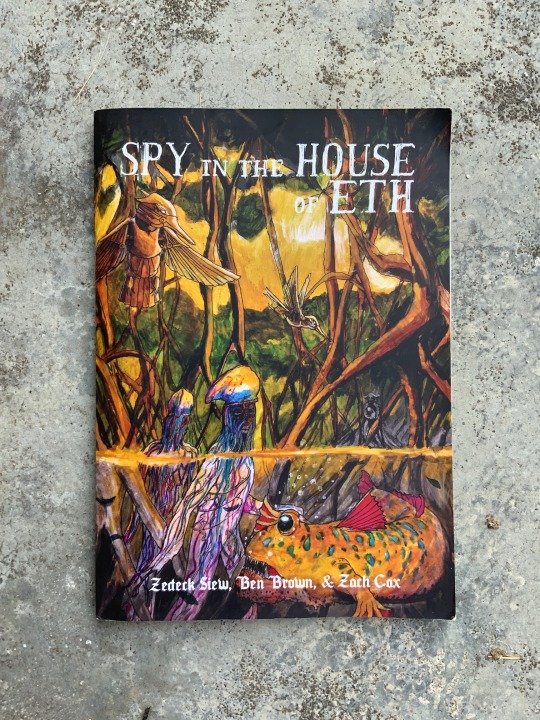
So this week I was hit with a pang of sentimentality for an older work:
"Spy In The House Of Eth".
"Spy" was published by Soulmuppet Publishing for their Best Left Buried horror-fantasy TTRPG, back in 2020; it was part of a slate of adventures, commissioned and funded as part of Zinequest 2.
A mangrove- and plantation-themed hexcrawl. A landscape changed (and changing) because of colonial-capitalist agro-industry. Displaced locals fomenting rebellion. A tycoon recycling the souls of his labour-force. Said tycoon engineering a hostile takeover of hell, so hell is made worse, and merges with the waking world.
+
When I flip through it now I mainly see its faults. The text feels underwritten. It is cramped, and rushed. It is sorely in need of a better intro, to orientate players:
A summary of factions; and outline of events and possible outcomes; overarching design elements like the everspreading-hell-haze mechanic needs to go at the front of the book, not the back; etc.
Ultimately---even though for quite a while "Spy" was the longest TTRPG text I'd ever written---I tried to do too much in too small a space. This is a full adventure campaign. I should've have shoved it into 60 pages. I should've saved it for a 200-page book, let it breathe. That's an editorial decision, entirely my fault.
+
Nova was kind enough to take a look at it, recently. Her review was very good, very insightful.
I think she correctly diagnoses the fact that I buried the lede in terms of What This Book Is About:
"this is set in a colonised land, features hellish pollutions destroying the environment caused by the invaders, features slaves in an uprising against their owners, and that the players are asked to pick sides ... [but] that isn’t well stated outside the text itself ... probably needs to be summarised for the sake of selling to the table and for ease of play."
I have no defense for this, except a vague notion that it feels a little gauche to bang on the: "THIS IS AN ADVENTURE ABOUT THE EVULZ OF COLONIALISM AND CAPITALISM ERRYBODY!" drum.
The work should speak for itself!
But, then again, people can't hear the work properly if not enough context was built around it.
Again: this is on me.
+
Still:
I think the reason why I put so much into "Spy"; why I resisted explaining it so much; why it is still one of the favourite things I've made, despite its faults---
Is that it was kind of my first TTRPG thing. It predates Lorn Song, even though that came out first.
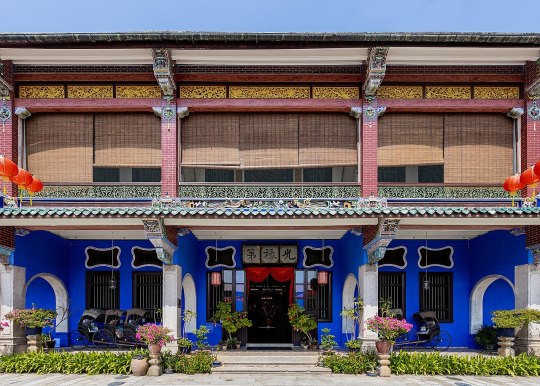
The mansion in "Spy" was the first TTRPG dungeon I ever drafted. A sheets-on-the-furniture, closed-up ancestral pile; with the current owners absconded to some big city with most of the money; adventurers picking over faded wealth.
It was inspired by the huge mansions of Malacca and Penang, and context mirrors the kind of thing those tycoon family did---suck a land dry, then leave for London or New York or wherever.
More generally, a lot in "Spy" is basically a fantastic version of my day-to-day reality.
The beacon is the refinery gas flare I see from my house:
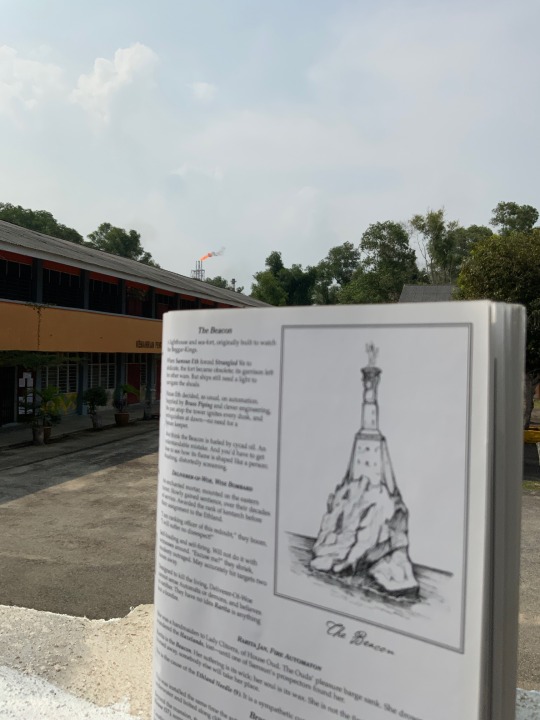
The bougainvillea monsters is because I have this monstrous bougainvillea in my yard:
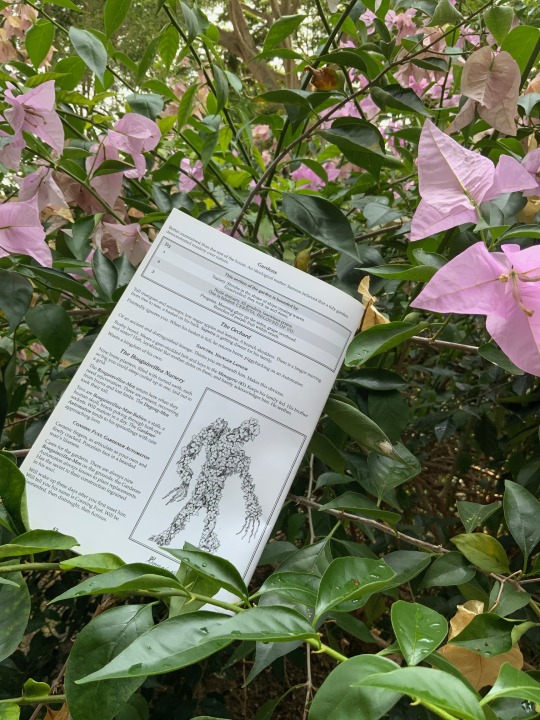
The monkeys and the kingfishers. The oil-palm monoculture, the oil-palm refinery we drive past every time we head north to Kuala Lumpur. The fact we travel southeast from the city to where we live, mirrored in the orientation and order of the hexcrawl.
The mangroves:
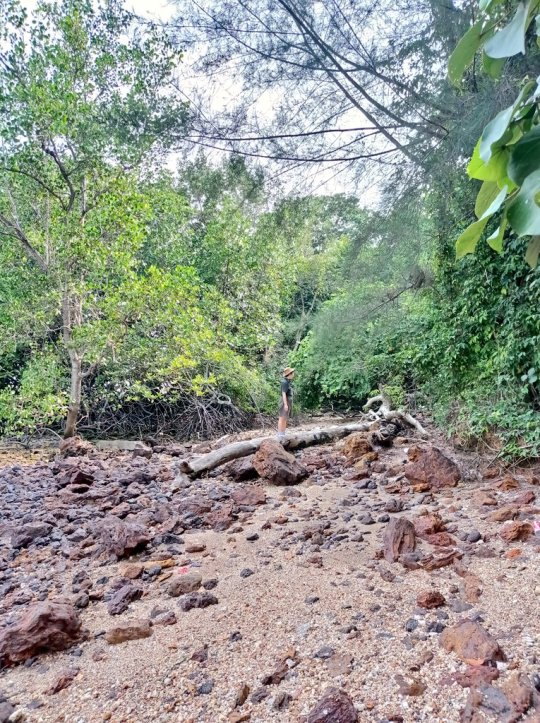
+
All this to say: I feel warmly about "Spy In The House Of Eth", and I feel like talking about it. If you've read it or you've played it: I would love to hear from you.
(It's available via the Soulmuppet store and Itch and Drivethru, among other places. Thank you, Zach, for publishing this.
It was published as a batch with four other adventures, all good---though my personal favourite of them is Luke Gearing's "Behind Closed Doors". I believe he is rewriting it???)
#fantasies#ttrpgs#writing#adventures#campaigns#hexcrawls#spyinthehouseofeth#mangroves#colonialism#capitalism#oil palms#kingfishers#best left buried
22 notes
·
View notes
Text
Prepackaged instant noodles have their origins in the cheap price for wheat and fat (in the original case, soybean oil) dumped by the US on its East Asian protectorates, South Korea and Japan, as American aid after the Second World War and the Korean war. Since then, prepackaged instant noodles have become a staple of migrant workforces around the world. In China, the prepackaged instant noodle has become a fixture of life for the country’s poorest people and especially in the dormitories and cramped apartments of migrant workers. In this sense, it powered and continues to power the production of a huge proportion of the world’s material culture that flows outward from those factories. Nearly everything that surrounds me as I write to you emerged from or contains components built in coastal Chinese plants where palm oil-heavy instant noodles form a fixture of young migrant workers’ diets. Dozens of parts of the computer on which I type, the wax on the table on which it sits, the small plastic bottle of hand cream, the shoes I am wearing and so much more.
Max Haiven, Palm Oil: The Grease of Empire
278 notes
·
View notes
Text
A Scottish research team believe they may have produced the "holy grail" alternative to palm oil. It is estimated that almost half of all food and cosmetic products on supermarket shelves contain palm oil. The huge demand has led to significant deforestation in areas where oil palm trees can grow near the equator. Food experts at Queen Margaret University (QMU) in Edinburgh say their new 100% plant-based ingredient is 70% better for the environment. And with 80% less saturated fat and 30% fewer calories, they are also hailing PALM-ALT as a significantly healthier option. Catriona Liddle, one of the lead developers on the QMU team, said: "It's the holy grail to replace it and still have exactly the same end result in product - to taste the same and have the texture the same - and we've done that.
Continue Reading.
704 notes
·
View notes
Text

108 notes
·
View notes
Text

Christ Receiving the Children
Artist: Sébastien Bourdon (French, 1616–1671)
Date: 1650–1660
Medium: Oil on canvas
Collection: Art Institute of Chicago, Chicago, IL, United States
Description
In this illustration of an episode from the Gospel of Mark in the New Testament, Jesus (reclining at center) admonishes his disciples not to prevent little children from approaching him. Sébastien Bourdon's figures wear draperies in the antique fashion, and the setting evokes both ancient Rome and the Christian Holy Land.
One of the most versatile and successful 17th-century French painters, Bourdon emulated the rigorous classical style of Nicolas Poussin. Bourdon knew Poussin's work (such as the painting on view in this gallery) from his early years in Rome. Following Poussin's compositional principles, Bourdon organized this scene as a series of parallel, stage-like registers, resulting in a calm, geometric order.
#painting#oil on canvas#fine art#artwork#christianity#gospel of mark#biblical scene#jesus#christ receiving the children#children#men#women#architecture#french culture#oil painting#landscape#palms#cloudy horizon#french art#sebastien bourdon#french painter#17th century painting#european art#art institute of chicago
44 notes
·
View notes
Note
are avacados / palm oil any worse for the environment than any other crop?
They’re worse than some crops, but they’re not the worst by any means. That dubious honour probably belongs to feeder crops that are grown to feed farmed animals, because of the enormous land/water use and the opportunity costs of growing food to feed farmed animals, who will produce far few calories than they take in.
Avacados are a pretty thirsty crop, as are many crops grown on trees. They use about 140-272 litres to produce a single fruit. That sounds like a lot out of context, and it is, but just by comparison, bananas use 790 litres and apples use 822 litres. Water use does vary depending on where the crop is grown though, wetter climates of course require less watering.
Their carbon emissions are not high, mostly accounted for by transport. The other significant environmental issues are soil degradation (as with any mass grown crop) and deforestation, particularly in Mexico. The thing to remember though is that avocado is often served in salads, on toast etc. where there may have previously been far less sustainable products, like meat.
As with all things, sustainability is relative. A single avocado requires 140-272 litres of water, but the same amount of beef requires 2,315 litres of water. Similarly, the average carbon footprint of one avocado is around 0.19 kilograms of CO2 equivalents, while the same amount of meat produces 4 kilograms. If you’re replacing something like hummus with avocado the impact will be higher, whereas if you’d otherwise be eating meat then it’s a far more sustainable choice.
Palm oil is a tough one because it can be grown quite sustainably, it’s just that conventionally grown palm oil isn’t. It is a major driver of deforestation and habitat loss, again nowhere near as bad as something like beef, but that isn’t what palm oil is replacing. The alternatives for palm oil are almost all more sustainable, including vegetable and olive oil, which isn’t the case with avocados. It is best to just avoid buying products containing palm oil that isn’t RSPO certified. If the ingredients just says ‘palm oil’ then it’s unlikely to be sustainably grown.
37 notes
·
View notes
Text
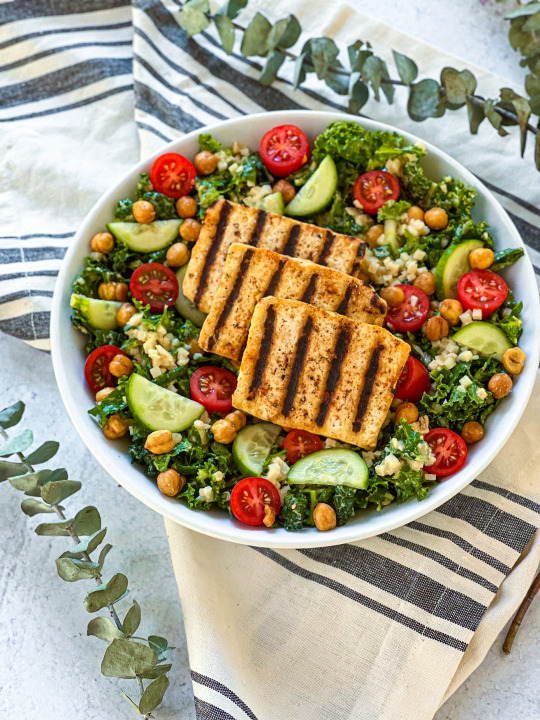
Vegan Kale Caesar Salad with Grilled Tofu
#vegan#lunch#dinner#salad#Caesar salad#cucumber#kale#tomatoes#tofu#chickpeas#hearts of palm#lemon#coconut aminos#paprika#garlic powder#olive oil#salad dressing#miso#tahini#mustard#maple syrup#parsley#nutritional yeast#💚
111 notes
·
View notes
Text


oil pastelled all ove the place today
39 notes
·
View notes
Text
Indonesia Says a Half Million Acres of Palm Plantations will be Turned Back into Forests https://www.goodnewsnetwork.org/indonesia-says-a-half-million-acres-of-palm-plantations-will-be-turned-back-into-forests/
#good news#science#environmentalism#nature#environment#palm oil#palm plantations#indonesia#forests#reforestation
185 notes
·
View notes
Text

Victor Grasso, "SOS", 2017, oil on board. B. 1977, Cape May Court House, NJ, EEUU.
#victor grasso#SOS#2017#oil on board#oil painting#american artist#painting#art#white#dress#woman#portrait#burning#palm#leaf#dark#land#realism#surrealism#figurative art#contemporary art#american art
24 notes
·
View notes
Text
"As countries around the world begin to either propose or enforce zero-deforestation regulations, companies are coming under growing pressure to prove that their products are free of deforestation. But this is often a far from straightforward process.
Take palm oil, for instance. Its journey from plantations, most likely in Indonesia or Malaysia, to store shelves in the form of shampoo, cookies or a plethora of other goods, is a long and convoluted one. In fact, the cooking oil or cosmetics we use might contain palm oil processed in several different mills, which in turn may have bought the raw palm fruit from several of the many thousands of plantations. For companies that use palm oil in their products, tracing and tracking its origins through these obscure supply chains is a tough task. Often it requires going all the way back to the plot level and checking for deforestation. However, these plots are scattered over vast areas across potentially millions of locations, with data being in various states of digitization and completeness...
Palmoil.io, a web-based monitoring platform that Bottrill launched, is attempting to help palm oil companies get around this hurdle. Its PlotCheck tool allows companies to upload plot boundaries and check for deforestation without any of the data being stored in their system. In the absence of an extensive global map of oil palm plots, the tool was developed to enable companies to prove compliance with regulations without having to publicly disclose detailed data on their plots. PlotCheck now spans 13 countries including Indonesia and Malaysia, and aims to include more in the coming months.
Palm oil production is a major driver of deforestation in Indonesia and Malaysia, although deforestation rates linked to it have declined in recent years. While efforts to trace illegally sourced palm oil have ramped up in recent years, tracing it back to the source continues to be a challenge owing to the complex supply chains involved.
Recent regulatory proposals have, however, made it imperative for companies to find a way to prove that their products are free of deforestation. Last June, the European Union passed legislation that prohibits companies from sourcing products, including palm oil, from land deforested after 2020. A similar law putting the onus on businesses to prove that their commodities weren’t produced on deforested land is also under discussion in the U.K. In the U.S., the U.S. Forest Bill aims to work toward a similar goal, while states like New York are also discussing legislation to discourage products produced on deforested land from being circulated in the markets there...
PlotCheck, which is now in its beta testing phase, allows users to input the plot data in the form of a shape file. Companies can get this data from palm oil producers. The plot data is then checked and analyzed with the aid of publicly available deforestation data, such as RADD (Radar for Detecting Deforestation) alerts that are based on data from the Sentinel-1 satellite network and from NASA’s Landsat satellites. The tool also uses data available on annual tree cover loss and greenhouse gas emission from plantations.
Following the analysis, the tool displays an interactive online map that indicates where deforestation has occurred within the plot boundaries. It also shows details on historical deforestation in the plot as well as data on nearby mills. If deforestation is detected, users have the option of requesting the team to cross-check the data and determine if it was indeed caused by oil palm cultivation, and not logging for artisanal mining or growing other crops. “You could then follow up with your supplier and say there is a potential red flag,” Bottrill said.
As he waits to receive feedback from users, Bottrill said he’s trying to determine how to better integrate PlotCheck into the workflow of companies that might use the tool. “How can we take this information, verify it quickly and turn it into a due diligence statement?” he said. “The output is going to be a statement, which companies can submit to authorities to prove that their shipment is deforestation-free.” ...
Will PlotCheck work seamlessly? That’s something Bottrill said he’s cautiously optimistic about. He said he’s aware of the potential challenges with regard to data security and privacy. However, he said, given how zero-deforestation legislation like that in the EU are unprecedented in their scope, companies will need to sit up and take action to monitor deforestation linked to their products.
“My perspective is we should use the great information produced by universities, research institutes, watchdog groups and other entities. Plus, open-source code allows us to do things quickly and pretty inexpensively,” he said. “So I am positive that it can be done.”"
-via Mongabay, January 26, 2024
--
Note: I know it's not "stop having palm oil plantations." (A plan I'm in support of...monocrop plantations are always bad, and if palm oil production continues, it would be much better to produce it using sustainable agroforestry techniques.)
However, this is seriously a potentially huge step/tool. Since the EU's deforestation regulations passed, along with other whole-supply-chain regulations, people have been really worried about how the heck we're going to enforce them. This is the sort of tool we need/need the industry to have to have a chance of genuinely making those regulations actually work. Which, if it does work, it could be huge.
It's also a great model for how to build supply chain monitoring for other supply chain regulations, like the EU's recent ban on companies destroying unsold clothes.
#deforestation#palm oil#indonesia#malaysia#agriculture#european union#united states#save the forest#open source#technology#mapping#forestry#satellite#good news#hope#climate solutions#environment
122 notes
·
View notes
Text

Achilles Lamenting the Death of Patroclus
Artist: Gavin Hamilton (Scottish, (1723-1798)
Date: 1760-1763
Medium: Oil on Canvas
Collection: National Galleries, The Mound, Edinburg, Scotland
DESCRIPTION
Achilles refuses the comfort of his Greek comrades as he grieves over the dead body of his close friend and possible lover, Patroclus, who was killed by the Trojans. The enormous size of Hamilton's painting conveys a sense of his ambition to depict episodes from Homer's Iliad in an overpowering, epic mode. His heroic compositions were designed to convey the dramatic and emotional range of the epic poem, based on Alexander Pope's English translation. Hamilton painted six canvases, each commissioned by a different patron. This one, the finest in the series, was made for Sir James Grant between 1760 and 1763, and secured an international audience through Domenico Cunego's reproductive engravings.
#painting#mythology#achilles#patroclus#lament#18th century painting#scottish art#european#oil on canvas#gavin hamilton#scottish painter#greek mythology#landscape#people#horse#homer's iliad#epic poetry#palms
30 notes
·
View notes
Text
In her fascinating study of the dense networks of entanglement, contradiction, and conflict in Indonesia’s forests, many of which are today being razed for palm oil plantations, anthropologist Anna Tsing encourages us to recognize that capitalism advances through the friction between its universal logic of accumulation and the particular cultures, lifeways, and structures of power in each locale. Contrary to the dreams of a “friction-free” capitalism promised by billionaire, philanthropist, and self-styled intellectual Bill Gates, capitalism is defined by conflict and tension. Gates is only the latest of a long line of capitalist thinkers to dream that the free market, if allowed to flourish without regulation, will create a smooth world where the hardworking and talented, no matter their origins or station in life, could compete to succeed, and that this competitive striving would have beneficial effects for global society at large: greater wealth and greater innovation. Even many critics of capitalism fall prey to the myth of frictionlessness in their attempts to explain the nefarious clockwork of this demonic machine that metabolizes people and the earth not only into profit, but into the energy that fuels system’s endless reproduction and expansion. Tsing’s insistence that we look to the friction encourages us to recognize that what moves this machine forward (and halts its “progress”) is the friction that stems from forms of complicity and resistance, acquiescence and refusal that define every point where the abstract system of capitalism encounters the material realities of the entangled earth and its people.
Max Haiven, Palm Oil: The Grease of Empire
79 notes
·
View notes
Text




Plant of the Day
Sunday 24 March 2024
The evergreen Fatsia japonica (Japanese aralia, false castor oil plant, fatsi, fig-leaf palm, glossy-leaved paper plant) will make a large garden shrub but is extremely tolerant of being root bound and will survive in a container. The flowers and fruit clearly show that it is a member of the ivy family, Araliaceae.
Jill Raggett
#fatsia#Japanese aralia#false castor oil plant#fatsi#fig-leaf palm#glossy-leaved paper plant#plants#evergreen#shrub#horticulture#containers#front garden#garden#berries
79 notes
·
View notes
Text
paz and axe should’ve KISSED they should’ve moved in together and they should’ve raised ragnar as a FAMILY they could’ve been EVERYTHING they could’ve been REPRESENTATION they could’ve been the link and bond between the two WORLDS they could’ve been what nitearmor is already in canon but just one step further bc it’s more BELIEVABLE they could’ve been EVERYTHING but favroni are COWARDS
#cradling pazaxe (paxe- whatever) in my palm gently while fending off favroni with a stick#pazaxe is just nitearmor but they can just be silly little guys and have a family 🫶#sigh.#need more pazaxe content#stuff that’s respectful to the creed too btw. don’t want any of that ‘cult’ bullshit.#either you respect the COTW’s creed or you fuck right off my blog.#star wars#the mandalorian#paz vizsla#axe woves#pazaxe#paxe#ragnar#oil.
290 notes
·
View notes
